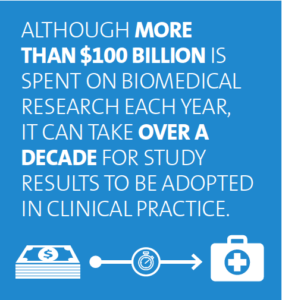The DCRI convenes DCRI Think Tanks on a regular basis to inspire collaboration around solving the most critical gaps in clinical research. At its most recent event, participants discussed implementation science.

Although more than $100 billion is spent on biomedical research each year, it can take over a decade for study results to be adopted in clinical practice. To address this challenge, the DCRI hosted a DCRI Think Tank entitled “Fast-tracking Research Results into Practice: Designing and Testing Effective Strategies for Implementing Evidence-Based Medicine,” which was directed by Tracy Wang, MD, MHS, MSc, (pictured left) director of the DCRI’s Health Services and Outcomes Research, and Amy Kilbourne, PhD, MPH, director of the VA Quality Enhancement Research Initiative (QUERI) at the University of Michigan. The meeting brought together numerous stakeholders, including academic researchers, health care practitioners, pharmaceuticals representatives, FDA leaders, and patients, for a discussion on how best to implement findings from research.

Members of the diverse group shared their perspectives and eventually came to a consensus about how to define implementation research. They defined it as the study of methods to promote the systematic uptake of research findings and other evidence-based practice into routine practice. Participants also agreed that the ultimate goal of implementation research is to improve the delivery and effectiveness of health care.
The discussion also focused on challenges currently impeding the implementation of research findings. Takeaways included the importance of emphasizing implementation throughout the product development pipeline. Participants brainstormed approaches to streamline the path from discovery to application, including designing innovative trials that reflect real-world populations and health care delivery environments as well as incorporating various perspectives from clinicians and patients throughout the process.
This article originally appeared in the DCRI’s 2018-2019 Annual Report. View more articles from this publication.